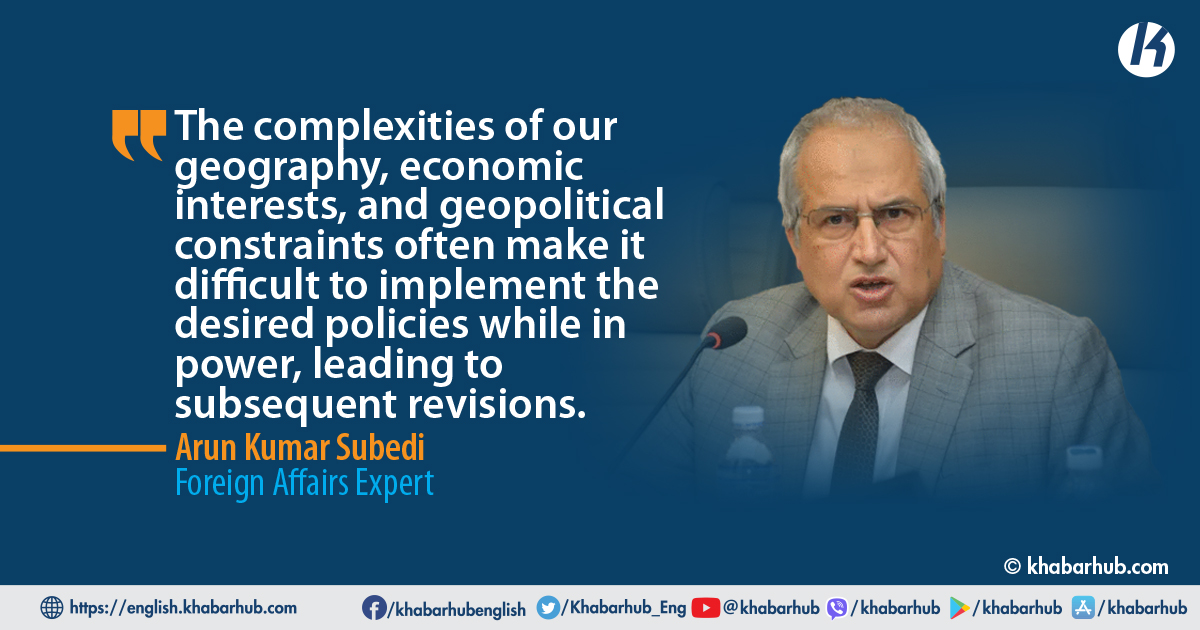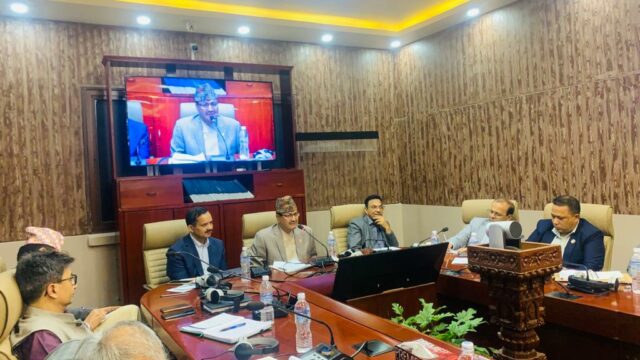0%

Speaking from a scientific perspective, much like mathematics, the influence of two key ministries—Foreign Affairs and Finance—can significantly impact the trajectory of a nation like Nepal.
Notably, these ministries share the same foreign minister, a point I wish to emphasize in his presence.
Over the past 15-20 years, I have consistently advocated for a revision of Nepal’s foreign policy, a view now echoed by many of my associates.
The time has come to reconsider the foundational principles governing Nepal’s foreign policy, even in light of our constitutional framework.
In international politics, countries typically shape their foreign policies in alignment with their national interests, but Nepal has embedded these principles within its constitution.
This constitutional entrenchment poses a significant challenge, as it constrains us from adapting our foreign policy to changing circumstances.
Therefore, I believe it is crucial to reevaluate and reinterpret the constitutional guidelines that dictate our foreign policy, often referred to as our non-aligned foreign policy.
During my brief tenure as an advisor to the Prime Minister, some voiced concerns over entrusting this responsibility to someone critical of a non-aligned foreign policy.
Consequently, it is essential to adopt a more strategic approach by expanding our labor missions and enhancing our ties with countries that hold increasing importance for us. Surprisingly, this aspect has not received the attention it deserves.
However, now is the time to clarify the scope of our non-alignment stance. If we restrict non-alignment to merely abstaining from international military alliances, we will repeatedly fail to safeguard our national interests.
Economic stability is paramount, and any deviation from this focus can lead to financial crises.
As someone with a background in the financial sector, I understand the importance of “Money Speaks.” In a world where economic interests dominate, it is essential for everyone to acknowledge this reality.
To effectively protect our national interests and adapt to the evolving global landscape, we must overhaul the theoretical foundation of our foreign policy.
This change is not just advisable but necessary for Nepal’s future prosperity and security.
I have consistently emphasized that our foreign policy is rooted in five fundamental principles. The foremost among these is the political foundation.
Nepal’s commitment to being an integral part of the international democratic community, what I refer to as the “Nepal International Democratic Community,” is a manifestation of our national ethos and interests.
In shaping both our foreign and economic policies, we have, unfortunately, allowed four critical misconceptions to hold sway.
These misconceptions have driven our politics and foreign policy choices, often to our detriment, due to a lack of clear definition by those responsible.
The first of these four misconceptions pertains to internal discord within Nepal, particularly rooted in our traditional culture and religion.
This internal strife has hindered our progress and should be acknowledged as an obstacle.
The second internal challenge is posed by those who, despite contributing to GDP through capital mobilization, taxation, and infrastructural development, can be considered internal adversaries.
Among the external challenges, the two most prominent are the pervasive influence of the ‘International Democratic Community,’ which encompasses Indian expansionism, and the long-standing presence of American imperialism.
These four misconceptions have significantly shaped our foreign and economic policies, often to our disadvantage.
Regrettably, the complexities of our geography, economic interests, and geopolitical constraints often make it difficult to implement the desired policies while in power, leading to subsequent revisions.

Despite the ambiguity surrounding these principles, I have tirelessly advocated for their clarity and definition, even if it means standing alone.
Furthermore, we must consider our national aspirations, natural geography, economic landscape, and cultural ties.
Identifying our strengths and connectivity, as well as supply systems, is crucial in determining our foreign policy.
It is essential to recognize that our natural resources have a natural market, a reality that some may dislike but is inherently an “Indocentric policy.”
One of the most pressing challenges in Nepal-China relations is rooted in fundamental principles, especially since Xi Jinping assumed his second presidential term.
Thirdly, our labor relations have witnessed significant improvements and are now a growing aspect of our national interests.
Consequently, it is essential to adopt a more strategic approach by expanding our labor missions and enhancing our ties with countries that hold increasing importance for us. Surprisingly, this aspect has not received the attention it deserves.
Countries like Saudi Arabia, Qatar, and Kuwait have gained greater significance in our foreign policy landscape compared to traditional partners like Germany.
Consequently, it is imperative to redefine the scope and status of our diplomatic missions in these countries, given the substantial relationships at stake.
It appears that our foreign policy continues to be influenced by the nostalgia of past eras, particularly the times of BP Koirala and King Mahendra.
These earlier paradigms were framed during a different geopolitical landscape, primarily concerned with navigating the challenges posed by the Warsaw Pact and NATO. The relevance of non-alignment, as well as groups like Sark, has evolved significantly since then, making it essential to adapt to the contemporary international milieu.
Our relationship with the donor community also merits consideration. The Nepalese economy heavily relies on donor support, and their interests and concerns hold substantial sway over our foreign policy decisions.
The fifth pillar of our foreign policy, rooted in diasporic and cultural interests, is equally significant.
Recent events, such as the distressing incident of a mass lynching against Christianity in Pakistan, underscore the importance of protecting the interests of Nepalese diaspora communities worldwide.
The concerns of American and British passport holders, as well as those of Nepalese origin, resonate deeply with Nepal.
Similarly, we should not ignore the interests of Nepalis in Assam and Meghalaya, even if they are third or fourth-generation Indian citizens. These considerations should form a cornerstone of our foreign relations.
The influence of the Nepalese diaspora can also impact the power dynamics involving America.
Our relationship with China demands a classical approach, while in other aspects of international relations, we have often held onto the legacy of leaders like BP Koirala and King Mahendra.
Therefore, it is imperative that we redefine Nepal’s foreign policy based on these five principles and establish a solid theoretical foundation, even if it may seem overdue.
One of the most pressing challenges in Nepal-China relations is rooted in fundamental principles, especially since Xi Jinping assumed his second presidential term.
It is evident that there has been a significant shift in China’s foreign policy approach toward South Asia as a whole.
Previously, the concept of “India Plus One” was central to China’s South Asia strategy.
However, in the context of Nepal’s foreign policy, three key pillars shaped the relationship.
First, Nepal consistently acknowledged Tibet as an ‘integral part of China.’ This stance served as a foundational premise in our interactions with China.
Secondly, we have steadfastly adhered to the one-China policy regarding Taiwan, and this commitment remains unchanged. There has been no deviation from our stance on this matter.
The third pillar of our Nepal-China relationship lies in our commitment not to employ Nepalese territory for strategic purposes against China.
While we have abided by these principles, China has also refrained from expanding the dimensions of its foreign policy toward Nepal. Initially, this bilateral understanding worked well for both parties.
However, as China began to incorporate Nepal into its broader foreign policy strategy, notable shifts in their approach became apparent, evident in their past activities.
When Nepal initiated non-strategic relationships with other countries, Beijing reacted, raising challenging questions for us. Managing these dynamics presents a formidable challenge.
In our interactions with China, we have not consistently adopted a classical approach when it is warranted.
These situations underscore the importance of proactively addressing these issues, especially as they relate to our five foundational principles rooted in our natural, economic, and geographical interests.
Our relationship with China demands a classical approach, while in other aspects of international relations, we have often held onto the legacy of leaders like BP Koirala and King Mahendra.
This incongruity poses a significant problem in our dealings with China and calls for a more categorical approach in addressing these issues.
Currently, there are certain points of contention in our relationship with China. Any rift in our ties with a major power like China could prove to be a daunting challenge.
For instance, China has started referring to projects under the Belt and Road Initiative (BRI) outside the scope of our signed agreements.
Moreover, unilateral discussions regarding the Galwan Special Industrial (GSI) and Galwan Cultural Industrial (GCI) zones have arisen, despite our lack of participation or acceptance.
During the visit of our Vice President to China, a tweet from the Chinese Ministry of Foreign Affairs claimed advancements in strategic aviation cooperation between our nations.
These situations underscore the importance of proactively addressing these issues, especially as they relate to our five foundational principles rooted in our natural, economic, and geographical interests.
(An edited excerpt from the perspective shared by Arun Kumar Subedi, an expert in geopolitical affairs and former Foreign Affairs advisor to Prime Minister Sher Bahadur Deuba, during the interactive session on ‘Challenges and Opportunities in Nepal’s Foreign Policy,’ at the Pavilion Hall in Durbar Marg, Kathmandu)